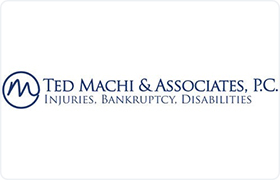Hurst Bankruptcy & Debt Lawyer, Texas, page 2
Sponsored Law Firm
-
 x
x

Click For More Info:
-
Machi & Associates, P.C.
1521 North Cooper Street Suite 550 Arlington, TX 76011» view mapAccident & Injury, Bankruptcy, Social Secuirty We Fight So You Don't Have To
Our professional team of attorneys and staff provide the experience and expertise needed to effectively handle your case.
800-804-0771
Benjamin C. Sauer
Contract, Personal Injury, Consumer Bankruptcy, Commercial Real Estate
Status: In Good Standing Licensed: 6 Years
Brandon Warren Weaver
Oil & Gas, Insurance, Credit & Debt, Personal Injury
Status: In Good Standing Licensed: 21 Years
Brandon Warren Weaver
Construction, Insurance, Credit & Debt, Personal Injury
Status: In Good Standing Licensed: 21 Years
Brandon Troy Hurley
Construction, Litigation, State Appellate Practice, Credit & Debt
Status: In Good Standing Licensed: 27 Years
Cary L. Jennings
Wills & Probate, Estate Planning, Business Organization, Bankruptcy
Status: In Good Standing Licensed: 42 Years
Chelsi Lake Reichenstein
Credit & Debt, Consumer Bankruptcy, Bankruptcy, Bankruptcy & Debt
Status: In Good Standing Licensed: 13 Years
FREE CONSULTATION
CONTACTChristopher Thomas Vickers
Litigation, Employee Rights, Business & Trade, Credit & Debt
Status: In Good Standing Licensed: 25 Years
 Ted Machi Arlington, TX
Ted Machi Arlington, TX Practice AreasExpertise
Practice AreasExpertise
